Every fall, around election time, the signs sprout like weeds in the median of Montlake Boulevard. Democrats, Republicans, ballot initiatives — hundreds of political signs of every color. And every year, Jeff drives along, indignant, and yanks them out, only to have them sprout again.
We were out for a sunny, relaxed evening of boating when Jeff told me about this. He’s a laid-back blues musician, but when he started talking about his crusade, his eyes flashed with real anger.
Why the crusade? Because the signs are illegally placed on the road right-of-way. Since no one will enforce this, Jeff takes the law into his own hands.
What is strange about this is that Jeff is not the only one. He’s just lucky that his tires are intact.
Three years ago, at a party, I heard the following amazing tale from another, completely unrelated Seattle friend. I’ll call him Floyd, because while he’ll tell the story to anyone over a beer, he doesn’t particularly want publicity.
In 2004, a four-by-eight-foot Bush-Cheney sign appeared beside a freeway north of Seattle. It stood on the grassy verge between the interstate and a small side road — smack dab in the public right-of-way.
Floyd drove past this sign every day, and like Jeff, it bugged him. He and several of his friends contacted the Department of Transportation, notifying them of the transgression and asking that the sign be removed.
The Department of Transportation took no action.
Like Jeff, Floyd decided to take the law into his own hands. But this wasn’t a sign you could just yank out of the ground. He purchased a cordless saw, and one evening, he drove out to the sign and cut it down. “The thing was huge,” he said. “It stood way over my head.”
Mission accomplished. But like Jeff’s signs, this one sprouted back like a giant weed.
Frustrated, Floyd drove back with his saw one Sunday evening. “Going back was definitely a mistake,” he admitted.
As he got out of his car with the saw, he was blinded by bright lights. Two huge men leapt out of a camouflage net, screaming obscenities at him.
Floyd’s first thought was that he could defend himself with the saw. Then he had second thoughts. “I thought I could take off somebody’s leg with this thing, and that would get me into real trouble!” He deliberately tossed the saw into the car and faced the enemy unarmed.
The two men advanced on him and began to rough him up. Both were over six feet tall, and Floyd isn’t a particularly tall or beefy fellow. He did the obvious thing: He ran. As he ran, he thought about his situation.
Since he was the one being assaulted, the smart thing would be to call the police. He stopped and pulled out his cell phone.
“I shouldn’t have done that. I should have kept running while I got the phone out.” Before he could make the call, his attackers caught up with him. Ouch.
They knocked him to the ground, tied his hands, and one of them put his heavy boot in the middle of Floyd’s back. It looked like a brutal beating was imminent. At that point, Floyd began screaming to attract attention, which annoyed and disconcerted his attackers.
“Go ahead. Call the cops,” they said.
When the police came, Floyd was tied up, face-down on the ground. “Am I under arrest?” Floyd asked. “Because if I’m not, you’d better untie me.” The policeman ignored the request.
“It seemed like the cop talked with the men forever, out of earshot, leaving me there tied up.” When the policeman came back, he arrested Floyd. He was unsure what to charge him with, and finally decided on something about defacing a political advertisement. “I’m not sure if I should impound your car. It’s not parked illegally, but…” the policeman said.
Floyd spent four hours in jail. When he returned to his car, all four tires were slashed. “Multiple times,” he said.
Floyd had his day in court, with mixed results. The sign was placed illegally, but it is also illegal to deface a political sign. Evidently, the two don’t cancel each other out.
Still, the judge and prosecuting attorney were sympathetic liberals, even if they couldn’t say so. According to Floyd, “At the final hearing, the judge joked, ‘Are you ready to do your volunteer service for the Bush-Cheney campaign?'”
Floyd’s community service involved planting trees in a park with some little old ladies, an activity he enjoyed. It was fitting punishment for cutting down an illegal weed. Still, he won’t be taking the law into his own hands like that again.
That’s OK, because I know Jeff is still on his crusade. I only hope that he’s keeping an eye out for camouflaged vigilantes, taking the law into their own hands, as he removes the political weeds in the public right-of-way.

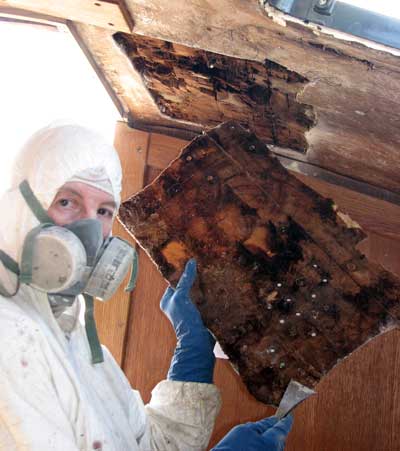 Instead, we have been working on fixing up the deck’s many holes, some of which were letting water (and then rot) into the balsa core. There are one or two that have grown well beyond a little rot around a hole and instead became big areas to patch. Having done this already in the forward portion of the boat, we were relatively old hands, and one lesson I had learned was that cleanup is a big job, so why not make a big HUGE mess all at once, then just do the cleanup once.
Instead, we have been working on fixing up the deck’s many holes, some of which were letting water (and then rot) into the balsa core. There are one or two that have grown well beyond a little rot around a hole and instead became big areas to patch. Having done this already in the forward portion of the boat, we were relatively old hands, and one lesson I had learned was that cleanup is a big job, so why not make a big HUGE mess all at once, then just do the cleanup once.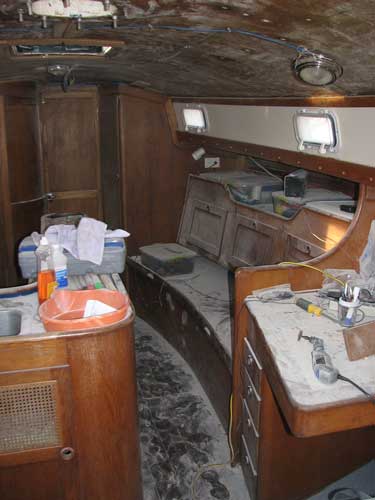 I think this was a good choice, but we sure did make a mess of the boat by now. As I write this, we just have to sweep and vacuum up all the dust, and then we can start putting some things back together. With any luck, it will never get to be quite this big a mess inside again!
I think this was a good choice, but we sure did make a mess of the boat by now. As I write this, we just have to sweep and vacuum up all the dust, and then we can start putting some things back together. With any luck, it will never get to be quite this big a mess inside again!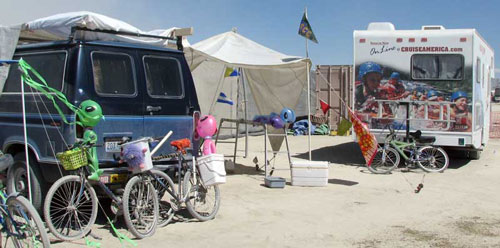 As we set up the giant canopy, I fretted about all those strangers walking through “our” space. Could we hang sheets or set up chairs to keep them from walking under our shade structure, or across our carpet?
As we set up the giant canopy, I fretted about all those strangers walking through “our” space. Could we hang sheets or set up chairs to keep them from walking under our shade structure, or across our carpet?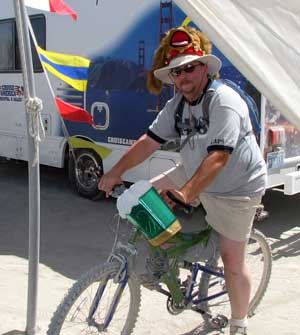 What had happened was this: As we sorted through the costumes, people came walking through our camp. We said hello and got into conversations with them. So the 45 minutes included about 5 minutes of costume-sorting and 40 minutes of making new friends.
What had happened was this: As we sorted through the costumes, people came walking through our camp. We said hello and got into conversations with them. So the 45 minutes included about 5 minutes of costume-sorting and 40 minutes of making new friends.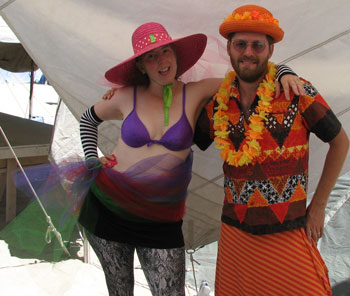 Along the way, we made a lot of new friends. I wish I had pictures of more of them. Heck, I wish I knew more of their names. They were strangers when they came to our crossroads, but they weren’t strangers when they left. And that’s the most time-consuming — and entertaining — thing we did for days.
Along the way, we made a lot of new friends. I wish I had pictures of more of them. Heck, I wish I knew more of their names. They were strangers when they came to our crossroads, but they weren’t strangers when they left. And that’s the most time-consuming — and entertaining — thing we did for days.